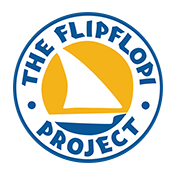Flipflopi completes 3rd expedition and baseline study: a step to building an innovative waste management centre in the Lamu archipelago
Despite being home to some of the lowest plastic-emitting countries in the world, more than 97,000 tonnes of per year is expected to wash ashore in affected countries on the Western Indian Ocean, yet there is a real lack of data in the region to quantify the impact and extent of litter.
This was a primary objective of our first-of-its-kind scientific expedition and baseline study to map the impact of marine waste around 300 km of the Lamu archipelago - in efforts to understand the most common types of plastic waste, their sources and how they impact lives and ecosystems.
The Flipflopi Project has undertaken a sailing and science expedition
Flipflopi’s 3rd and quite distinct expedition was led by local Lamu communities together with members of the scientific community. Observations from on-board Flipflopi showed that even in these remote island states, the problem in the mangroves and shorelines is worse than we imagined.
Lynette Aloo, Community Outreach leader, said:
“The deterioration in mangrove forests is alarming in Lamu County, home to over 65% of the mangrove forests in Kenya, including all of the nine species. During the macro litter plastic survey we saw dense distribution of plastic leading to destruction of the marine ecosystem. We’ve seen how it’s affected the regeneration and fish breeding areas. It’s of immense importance that this problem is tackled from all angles to ensure the pride of our heritage and livelihoods are not lost. “
Communities engagement
A key part of the study-based expedition was to look for possibilities for innovative local waste management solutions and affordable recycled plastic product alternatives that could benefit communities here.
And as we sailed from community to community, we saw clearly the appetite and need for new solutions to tackle what has become an overwhelming problem. We encountered a chief from one of the remotest villages here who highlighted the clear opportunity for scaling up the use of waste plastic as an alternative building material for traditional boats
“These canoes made from mango trees only last 2 seasons and we are running out of trees, whereas plastic lasts forever”
We met community groups taking matters in their own hands, like the tenacious Bahari Moha community of women collecting and sorting waste, doing what they can to re-use the waste from their environment.
Where there is a clear need for local and sustainable solutions to manage the waste, the challenges to recycle plastic are the key barrier in remote, low-income communities.
This is the reason we advocate for small-scale and deliberately low-tech plastic recycling machinery that can be easily constructed by local people. So on this expedition, we scaled up community outreach demonstrating a Precious-Plastic inspired bicycle-powered shredder, a small-scale extruder and easy to make PET bottle-string cutter – accessibility to low-cost, low-tech equipment is what will help local circular economies to grow.
Our 3rd expedition on Flipflopi Ndogo was a uniting and humbling experience.
Our beautiful multicoloured sailing dhow has proved again the incredible strength of this waste material, found washed up on Lamu shores only 5 years ago.
But preliminary observations have bolstered our ambitions to go big and bold on setting up what will be the first-of-its-kind waste material recovery centre and closed loop waste management system in this remote part of East Africa. We have now received our NEMA operating license for our plastic-recycling workshop in Lamu and continue to work closely with national and county governments on a holistic approach to tackling plastic pollution. This is a key step in moving towards a world where we reduce our waste whilst bringing jobs and value to communities.
Of course, the most important step will be the turning off tap altogether - and in the midst of world chaos, some incredibly hopeful news for the planet: the first global plastics treaty has been signed “A legally binding agreement between 175 countries encompasses all stages of plastic’s life cycle, from production to consumption and disposal”.
Onwards for the global plastic revolution and a world without single-use plastic.
Note:
The baseline study has been funded by the Sustainable Manufacturing and Environmental Pollution (SMEP) Program. In partnership with UK Aid, Flipflopi will be leveraging the results of the research to establish a first-of-its kind waste material recovery facility and heritage boat building training and manufacturing centre in the Lamu archipelago.
Thank you to all other expedition supporters: UNEP, French Embassy, Africa Legal Network, Slaughter and May, JW Seagon for your continued support.
And special thanks to all our partners including NEMA, Lamu County Government, National Museums of Kenya, KWS, KMA, KMFRI, University of Dar es Salaam, TakaTakaHeroes, CORDIO, University of Portsmouth, University of Northumbria, Watamu Marine Association, and the amazing Flipflopi team and all the truly inspiring community groups that we engaged with.







